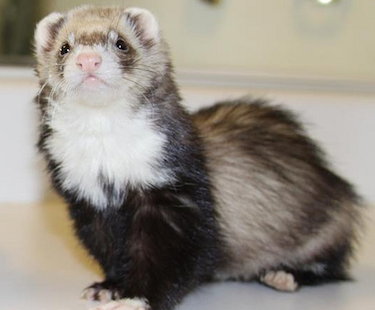
Ferrets are fun and furry animals that are super inquisitive and love to play. Their name comes from a phrase meaning “stinky little thief” since they are known to take and hide almost anything. They are mischievous but can be really cute and adorable.
Ferrets live an average of 6-12 years and sleep the majority of the day (16-20 hours). They do love to play and are very active and curious when awake. If you are not home often, you might want to consider adding a playmate for your ferret for companionship and entertainment. Always buy from a reputable dealer and check for any signs of illness. Males will be larger than females at full maturity, and adjustments should be made for their mating seasons.
Housing and Food
Aquariums are not recommended for housing ferrets because they lack proper ventilation. Cages should be at least 2 feet square or larger for each ferret. Make sure openings are smaller than the ferret’s head; if the head can fit through, most likely the body will follow and your escape artist is free! You can also build your own cage using C&C grids as described in our guinea pig care guide.
Sleeping areas should be kept clean and away from the litter box and food source. A box with old T-shirts, towels or sweaters works great, and you can easily wash the bedding. Ensure that sweaters do not have any loose threads, because string can choke a ferret if ingested. Ferrets have a habit of relieving themselves in corners, so place the litter box in the corner of the cage or room. Regular cat litter is normally used.
Ferrets love toys and things to play with, but avoid small toys or any toys with small or removable parts. These can be a choking hazard or cause a blockage in the intestines, both of which can be fatal.
Ferrets eat dry ferret food, and a food that is high in animal protein content is best. Low-quality foods with insufficient nutrition could cause your ferret to overeat in an attempt to get the nutrition it needs. Treats can include cooked chicken or rabbit, egg yolks, cod liver oil or store-bought ferret snacks. Clean water is a daily necessity and should be checked twice a day.
Proper Ferret Care — Health
Females can enter a period of “heat” and remain in it indefinitely. This can cause genital swelling, infections and more serious problems. Males can become aggressive and may harm other animals. Neutering or spaying the ferrets will deter these problems.
Another recent method is having your veterinarian insert an implant that keeps the ferret from going in season for up to 18 months at a time. Make sure you have a knowledgeable vet experienced with ferrets to explore which options are the best for you and your pet.
Vaccinations are very important for ferrets to avoid canine distemper and rabies (rabies is not present in every country, so this vaccination may not be needed).
Signs of Illness
Everyone wants a happy and healthy pet, but there are some warning signs to watch for with ferrets. They can catch the common cold, have tumors, hypoglycemia and viruses, and it’s time for a vet trip if you notice any of these symptoms:
- Lethargic behavior or stops playing
- Eyes appear dark, runny or have discharge
- Broken whiskers (can be a sign of poor nutrition)
- Dark discharge from the ears (potentially ear mites)
- Red gums or excessive tartar
- Broken teeth
- Lumps or abscesses on the body or felt under the skin
- Red spots (could be fleas — only treat with medication made for ferrets; cat and dog flea medications could cause serious injury)
- Brittle or coarse fur
- Stops producing waste or difficulty urinating (blocked waste could be an intestinal blockage and be fatal)
- Hair loss
- Weight loss
- Blood in the stool
- Tremors or seizures
The odor of a ferret has been the main reason people seem to dislike them. The smell comes from the oils in the ferret’s skin, and washing them excessively dries out the skin (in turn producing more oil). Some have suggested having the anal glands removed, but vets are beginning to caution against this as they deem it unnecessary. Check with your vet for his or her suggestion and experience.
The anal glands can release a scent when the ferret feels defensive or threatened. This smell will dissipate easily with some open windows. Any affected area can be washed with soap and water — which is much easier than skunk spray removal.
Let’s go for a walk!
Ferrets can be walked just like cats and dogs. They love exercise, and many love being outdoors with you. A body harness is best since ferrets can easily slip out of traditional leads and collar leashes. A collar with an identification tag is a good idea also; if your pet ever escapes it will be easily seen as a pet and easier to return to you. You can also ask your vet about microchipping your ferret.

Fun Facts
- Long ago ferrets were used to help control rabbit populations and flush out rabbit holes. They were also used to fend off pests and control rat populations on board ships.
- It is now illegal to use a ferret to hunt rabbits in the United States.
- Some companies trained ferrets to run wires and cables underground for fiber optic and telephone lines.
- Ferrets come from the same animal family as wolverines and otters.
Enjoy this video of adorable ferrets running around, playing and being mischievous:

Additional Resources
- Green Ribbon Campaign
- Common Ferret Myths
Photo: Silicon640c/Flickr


